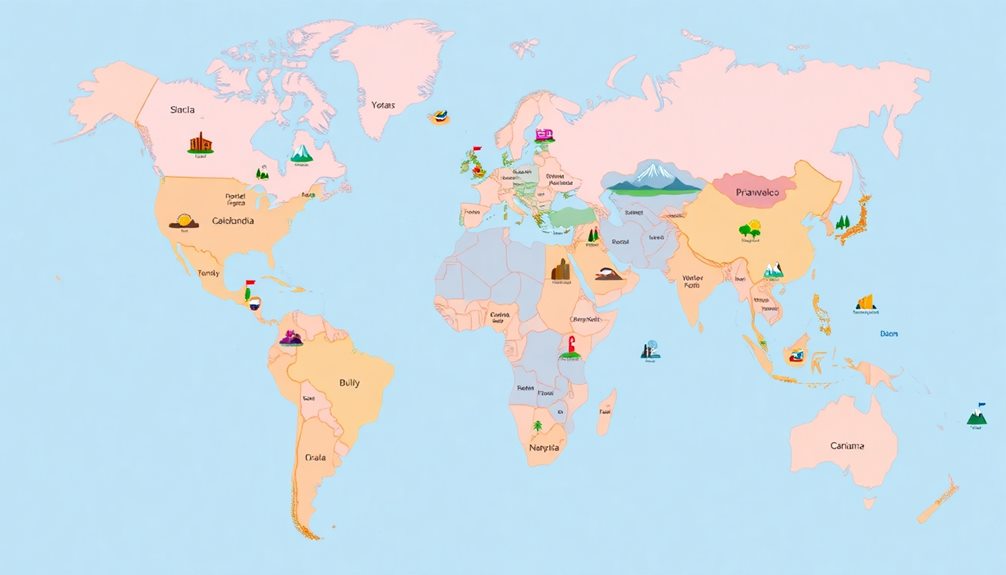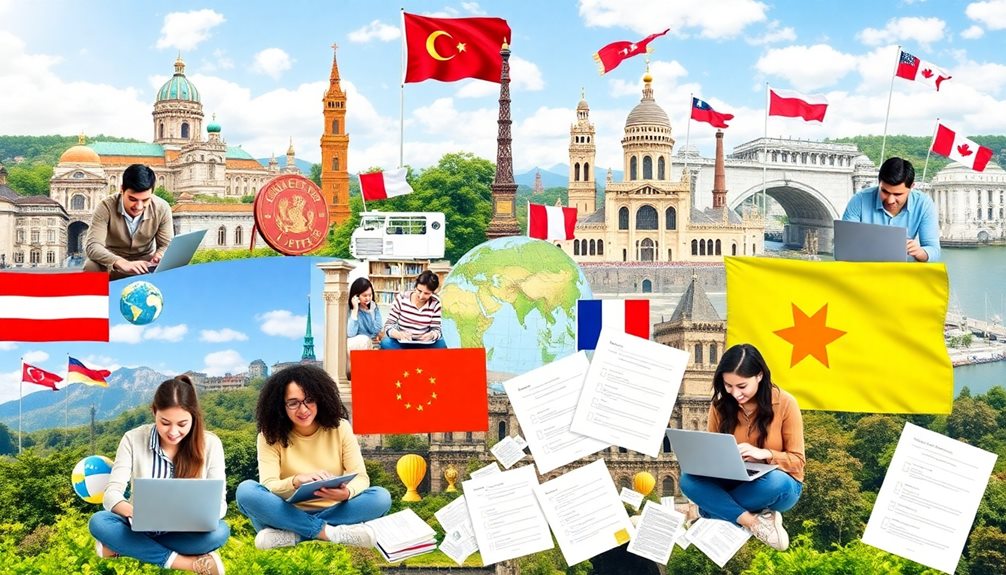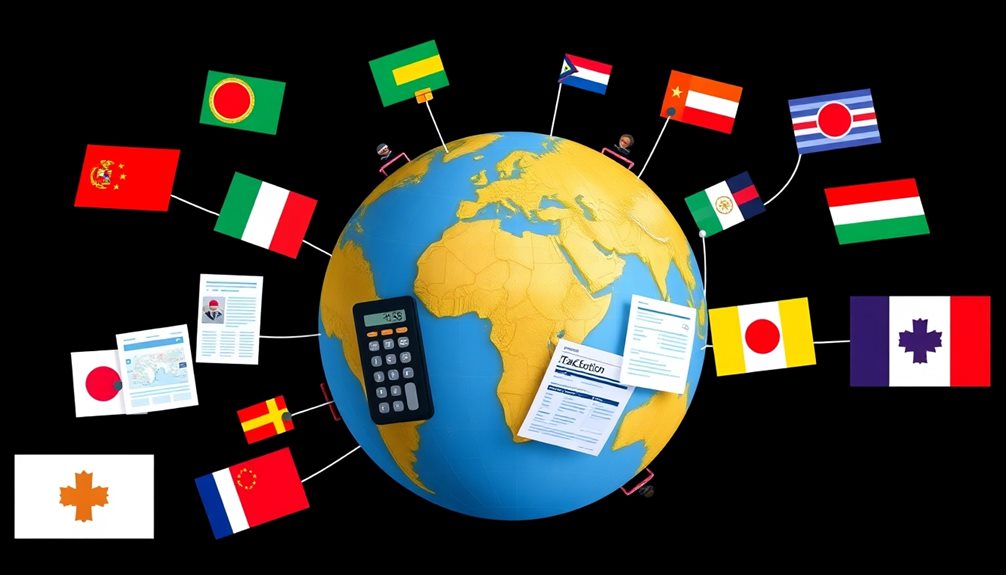Remote work visas offer exciting income opportunities globally, letting you live and work legally in various countries. Each destination has unique income requirements, with Brazil needing $1,500 monthly, Costa Rica at $2,500, and Iceland requiring €7,110. These visas enhance your flexibility and job security while contributing to the local economy. You'll also need valid health insurance and proof of financial stability to apply. Keep in mind that tax implications may vary, and some countries even offer tax benefits for remote workers. If you're curious about more specifics, you'll find plenty of valuable information ahead.
Key Takeaways
- Remote work visas enable legal residence and employment in various countries, enhancing global mobility for digital nomads.
- Countries like Brazil and Costa Rica require minimum monthly incomes of $1,500 and $2,500, respectively, for visa eligibility.
- Tax exemptions on foreign income are available in countries like Croatia and Cabo Verde, benefiting remote workers financially.
- Health insurance coverage is mandatory for remote work visa applications, with requirements varying by country, such as Belize's $50,000 minimum.
- Renewal options exist for many visas, with countries like Brazil and Mexico allowing extensions if income criteria are met.
Understanding Remote Work Visas

Remote work visas are becoming a popular way for people to explore the world while keeping their jobs. These visas allow you to legally live and work in a foreign country while maintaining employment with a company outside that nation.
Most countries offering remote work visas require you to provide proof of income and meet a minimum monthly income threshold, which can range from $900 to $7,110. For instance, Brazil typically requires $1,500, while Iceland demands €7,110 per month.
Financial planning essential for managing the costs associated with living abroad can help facilitate a smoother change during this exciting adventure.
You'll also need valid health insurance coverage as part of your application process. The documentation usually includes proof of employment or self-employment, which verifies your employment status and income.
Some countries, like Croatia and Cabo Verde, even offer tax exemptions for digital nomads, making them appealing options for extended stays.
Keep in mind that processing times can vary greatly, from just a few days to several months, depending on where you apply. Understanding these requirements and regulations is essential if you want to make the most of your remote work visa experience.
Benefits of Remote Work Visas

While many professionals seek new adventures, the benefits of remote work visas extend far beyond just travel. These visas enhance global mobility, allowing you to live and work in foreign countries, broadening your cultural experiences and professional networks.
As the global political climate shifts, with rising tensions among major powers, the ability to work remotely can provide job security and flexibility during uncertain times. By attracting skilled talent, remote work visas contribute considerably to economic growth in host countries, boosting local economies through increased spending increased focus on climate change policies through innovative remote work solutions.
Many countries offer favorable tax conditions, which can benefit you financially. For instance, digital nomads in Croatia enjoy exemptions that can lead to substantial savings. This financial incentive encourages business expansion into new markets, providing unique income opportunities for entrepreneurs and freelancers enthusiastic to tap into diverse economies.
Moreover, remote work visas promote an enviable work-life balance, enabling you to choose destinations that align with your lifestyle choices and professional goals. With the flexibility to work from anywhere, you can design an ideal environment that enhances both productivity and personal fulfillment.
Ultimately, remote work visas not only redefine where and how you work but also enrich your life through new experiences and connections, making them a valuable asset for today's modern professional.
Country-Specific Visa Options

When considering remote work visas, you'll find various options tailored to different countries. Each visa comes with its own income requirements and duration of stay, so it's crucial to compare them.
Additionally, the rise of AI online jobs has opened up new income opportunities that can be leveraged while working remotely.
Let's explore these country-specific visa types and see which one suits your needs best.
Visa Types Overview
Maneuvering the landscape of visa options for remote work can feel overwhelming, but several countries offer tailored solutions to help you live and work abroad.
Here's an overview of some popular visa types for remote workers:
- Australia: The Working Holiday Visa allows you to stay for one year, requiring proof of employment and a minimum income recommendation of $5,000 AUD for six months.
- Brazil: The Digital Nomad Visa permits a 12-month stay, extendable, with a minimum monthly income of $1,500 USD and international health insurance.
- Portugal: The D7 Visa welcomes expatriates, allowing remote workers to reside in the country with a minimum monthly income of €600.
- Estonia: This Digital Nomad Visa lets you stay for one year, with a minimum monthly income requirement of €3,504.
Each option has its visa requirements, whether it's proof of employment, health insurance, or a specified minimum monthly income.
Income Requirements Comparison
Maneuvering the income requirements for various country-specific remote work visas is essential for anyone looking to live abroad while working remotely. Here's a quick comparison of income thresholds and conditions across several countries:
| Country | Visa Type | Minimum Income Requirement |
|---|---|---|
| Brazil | Digital Nomad Visa | $1,500 USD monthly |
| Costa Rica | Digital Nomad Visa | $2,500 USD monthly or $60,000 savings |
| Germany | Freelance Visa | Varies by city; proof of income required |
| Croatia | Digital Nomad Visa | Approximately €30,471.72 annually |
| Portugal | D7 Visa | €600 monthly |
For instance, Brazil offers a digital nomad visa valid for one year, while Costa Rica allows you to stay for up to two years. In Germany, you'll need to show proof of income based on the city you choose. Portugal's D7 visa is a great option for remote workers earning from foreign companies. Be sure to check the application fees and specific requirements for each visa to guarantee a smooth change!
Income Requirements Breakdown

When applying for remote work visas, understanding the minimum income thresholds for each country is essential.
You'll need to gather the right documentation to prove your income, whether it's through pay stubs, bank statements, or freelance contracts.
Let's break down these requirements so you can prepare effectively.
Minimum Income Thresholds
Maneuvering the world of remote work visas involves understanding the minimum income thresholds set by different countries. Each nation has its own criteria, and knowing these can help you choose the right digital nomad visa for your lifestyle.
Here's a breakdown of some notable minimum income requirements:
- Brazil: $1,500 USD per month, plus proof of international health insurance.
- Costa Rica: $2,500 USD per month or $60,000 USD in savings for its Digital Nomad Visa.
- Croatia: Approximately $2,370 USD (or €2,200) monthly for the Croatia digital nomad visa.
- Estonia: Approximately $3,750 USD (or €3,504) monthly for the Estonia Digital Nomad Visa.
For remote workers considering Portugal, the D7 Visa has a much lower minimum income requirement of about $640 USD (or €600) per month.
Understanding these thresholds is vital, as they dictate your eligibility for each visa. Be sure to prepare your finances accordingly, as meeting these minimum income requirements is essential for a successful application.
Proving Income Documentation
Understanding the minimum income requirements is just the first step in applying for remote work visas; you also need to provide adequate proof of your financial stability. Different countries have varying income thresholds for their digital nomad visas, and you must submit the right proof of income documentation to guarantee your application process goes smoothly.
For instance, Brazil requires a minimum monthly income of $1,500 USD, while Costa Rica demands at least $2,500 USD monthly or $60,000 USD in savings. In both cases, official documentation like bank statements or employment contracts is necessary.
Croatia's digital nomad visa mandates proof of an annual income of at least EUR 30,471.72, so be prepared with relevant financial documents.
Portugal and Mexico also have their own income thresholds—€600 per month for Portugal and $2,500 USD for Mexico—each requiring clear income documentation for visa approval.
Gather supporting financial statements meticulously to validate your income claims and guarantee your remote work visa application meets all requirements. Your financial documentation is key to demonstrating your stability and securing your opportunity to work abroad.
Application Process Overview

The application process for remote work visas can seem intimidating, but knowing the key requirements can simplify your journey. Many countries offering digital nomad visas require you to meet specific income requirements, provide documentation, and guarantee you have health insurance coverage.
Here's a quick overview of what to expect during the application process:
- Proof of Employment: You'll need to demonstrate your ability to sustain yourself financially by showing proof of employment or self-employment.
- Minimum Income: Be aware of the minimum income thresholds set by each country. For example, Brazil requires $1,500 USD per month, while Estonia requires €3,504.
- Health Insurance: Guarantee you have health insurance that meets the required coverage amounts, often around $50,000 for certain countries.
- Processing Time: Application processing times vary. Greece might offer a fast track of 10 business days, while Portugal could take several months.
Make sure all documentation is in English or the official language of the country. Understanding these elements will streamline your application for remote work visas, allowing you to focus on your adventure ahead.
Health Insurance Considerations

When applying for a remote work visa, guaranteeing you have the right health insurance is vital. Most countries require proof of international health insurance that covers medical expenses in the host country, often with minimum coverage amounts specified. For instance, Belize mandates at least $50,000 in coverage.
Countries like Germany expect health insurance valid within their borders for visa holders, assuring access to local healthcare services.
Health insurance requirements can vary noticeably. Some countries allow private insurance, while others may insist on specific local plans. This means you need to research the health insurance stipulations for each country you plan to work in.
Some nations might require coverage for the entire duration of your stay, including any extensions.
Failing to provide adequate health insurance documentation can lead to visa application denials or delays, so compliance with local regulations is essential.
To avoid any issues, make certain you understand the coverage amounts and specific requirements before you submit your application.
Tax Implications for Remote Workers

Maneuvering tax implications as a remote worker can be tricky since obligations vary considerably by country. Understanding these differences is essential to guarantee compliance and avoid unexpected expenses.
Here are four key factors to take into account:
- Tax Residency: Many countries establish tax residency after 183 days of stay, triggering local tax obligations for remote workers.
- Local Taxes: Some countries impose local taxes on foreign income, while others may provide exemptions based on your income level.
- Proof of Income: Countries like Brazil require proof of income above the local minimum wage to qualify for tax exemptions associated with their digital nomad visa.
- Social Security: In certain jurisdictions, you might need to contribute to local social security systems, adding another layer to your tax obligations.
Additionally, verify you have international health insurance, as it's often mandated by remote work visas.
Handling these tax implications can be complex, but staying informed will help you manage your financial responsibilities while enjoying the benefits of remote work.
Renewal and Extension Guidelines

Guiding the renewal and extension process for your remote work visa can feel overwhelming, but it doesn't have to be. Many countries offering digital nomad visas, like Brazil and Mexico, have clear guidelines to help you navigate this process.
For instance, Brazil's digital nomad visa is valid for one year and can be renewed for another, provided you meet the income requirement. In Mexico, you can initially stay for up to one year, with the possibility of extension based on similar criteria.
In Croatia, applicants can secure a renewable one-year visa, maintaining an annual income of approximately €30,471.72. Costa Rica takes it a step further, offering a digital nomad visa for up to two years, contingent on a minimum monthly income of $2,500.
Estonia also allows for a one-year stay, with the option to extend if you continue to meet the income requirements.
To guarantee a smooth renewal or extension, stay informed about local laws and maintain valid documentation. Meeting income thresholds is vital, so keep your finances in check to enjoy your remote work experience abroad.
Frequently Asked Questions
Which Country Is Best for Remote Work?
When considering the best country for remote work, think about your income needs, lifestyle preferences, and cultural experiences. Countries like Portugal or Croatia offer affordable living while providing vibrant atmospheres and beautiful surroundings you'll enjoy.
Which Country Is Best for a Digital Nomad Visa?
When it comes to finding the perfect digital nomad visa, you've got a world of options. Portugal's D7 Visa stands out for its affordability and vibrant culture, making it a great choice for adventurous souls.
What Is the Cheapest Country to Live as a Digital Nomad?
If you're looking for the cheapest country to live as a digital nomad, consider Cabo Verde or Belize. Both offer affordable living costs, beautiful environments, and a relaxed lifestyle perfect for remote work.
Can I Work Remotely for a US Company From Another Country?
Sure, you can work remotely for a US company while sipping piña coladas on a beach—if you don't mind juggling local laws and visa regulations. Just don't forget about taxes; they love surprises!
Conclusion
As you step into the world of remote work visas, imagine sipping coffee in a sun-drenched café in Lisbon or working from a beachside bungalow in Bali. These opportunities not only broaden your horizons but also allow you to earn while exploring new cultures. With the right knowledge, you can navigate the visa maze and access a lifestyle filled with adventure. So pack your bags and get ready to embrace the freedom of working from anywhere!









